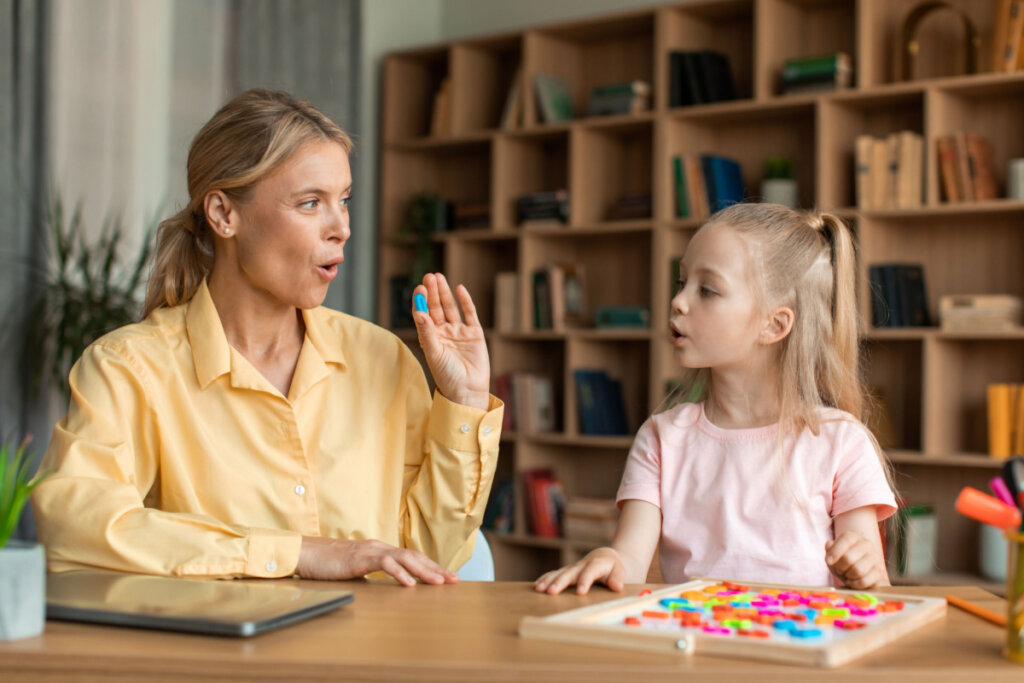How Parents Damage Children's Self-Esteem


Written and verified by the psychologist Valeria Sabater
As parents, we’d obviously like to know everything about how to raise and educate our children. Indeed, it’d be wonderful if each child came into the world with a manual that told us how to treat them, how to respond to their needs, and how to make them happy, independent, and self-fulfilling people. However, most of the time we find ourselves having to act blindly and almost instinctively.
One of the aspects in which we, as parents, usually make the most mistakes is in the care of our children’s self-esteem. In fact, we often adopt wrong approaches that, far from enhancing this dimension of our children’s psychological well-being, hinder it. One example is making excessive use of decontextualized and barely credible positive reinforcement, the kind with which we make our little ones believe that they do absolutely everything well.
Nevertheless, our children aren’t naive. We must set ourselves the objective to build in them an adequate sense of self-competence and self-love. That’s because, in a highly competitive society that likes to question our worth and self-image, nothing is as important as attending to this area of mental health.
It’s easier to develop healthy self-esteem as a child than to have to improve it as an adult.

How parents damage children’s self-esteem
Self-esteem refers to the way we see ourselves and also how we think others see us. This perception is almost always decisively influenced by our environment and, more especially, by our caregivers. In fact, every message given or not given, and every interaction and experience lived in early childhood are key to the construction of our self-esteem.
In other words, self-esteem isn’t only built by our own perceptions, but by the influence of our parents, siblings, teachers, and friends. Furthermore, it’s easier to develop it as a child than to have to repair it as an adult. In this regard, a study was conducted by the University of California (USA).
The study claimed that the family environment can sometimes be so complex that a child’s self-esteem can be affected by many factors. These include the values transmitted by the caregivers, the presence of psychological disorders in the parents, and economic problems.
On the other hand, we also can’t ignore those ways in which we, as parents, unknowingly damage our children’s self-esteem. Let’s find out about some of them.
Keeping children isolated from everyday challenges hampers their psychosocial development and the building of good self-esteem.
1. Not giving them age-appropriate responsibilities
Overprotection is poison for the correct development of children’s self-esteem. It’s crucial to remember that children need to feel competent. For this to occur, there can be nothing better than giving them age-appropriate responsibilities.
If, on the other hand, they grow up assuming that there’ll always be people who are willing to make their lives easy and solve their problems for them, sooner or later they’ll find themselves having to face reality.
Therefore, the child who discovers early that they’re capable of multitasking on their own effectively establishes self-efficacy.
What should we do?
Every day, multiple opportunities open up for children to learn to be more autonomous. We must encourage and trust their value and their abilities, according to their age.
2. Prevent them from making mistakes
As parents, we often spend a great deal of time acting as heroes and rescuing our children. We prevent their mistakes, failures, and disappointments and stop them from falling. However, letting them make mistakes and allowing them to put in the mental effort to resolve these kinds of incidents themselves gives them valuable opportunities for growth.
Self-esteem is also born in every adversity that’s overcome. This is something a child can learn from the simplest and most innocent experiences.
What should we do?
Although it’s a priority to safeguard the safety and well-being of our children, there are experiences that they must go through on their own. For example, not reminding them that they’ve left the ball at home before going to play in the park, will make them take responsibility for their things the next time without having to depend so much on us.
A child must learn to fail in order to understand how to succeed in life’s journey.
3. Protecting them from their own emotions
When a child is crying, sad, or frustrated, it’s tempting to buy them a popsicle or a toy. That immediately makes them smile. But what learning will they obtain from it? None.
In fact, as parents, we damage our children’s self-esteem by minimizing their emotions or by depriving them of the opportunity to learn to regulate them.
Self-esteem means knowing how to handle our own emotions without being carried away by them. Therefore, good emotional competence is another pillar for children to develop. It helps them acquire a positive self-image of themselves.
What should we do?
It doesn’t hurt to learn some adequate emotional intelligence strategies to help educate our children. After all, if we’re negligent in this area, our children will grow up unable to regulate their own emotions.
4. Educating them in perfection
Educating our children in perfection means educating them in anxiety and in the perception that they’re never up to what’s asked of them.
Obviously, every parent wants their children to be the best and the most successful. However, more important than exceptional achievement is happiness. They should enjoy their childhood and not start to develop unhealthy self-demand from an early age. In fact, the child and adolescent who grows up with the idea that they’re not doing enough are almost always accompanied by weak and fragmented self-esteem.
What should we do?
It’s a good idea to establish goals and purposes for our children, milestones in which they must strive. This promotes their maturity and responsibility. That said, these goals must be realistic and motivating, and they must agree with them.

5. The abuse of positive reinforcement
Sometimes, perhaps due to lack of time, we might overuse positive reinforcement. This means we have a tendency to describe everything our children do as extraordinary, and continuously tell them how great they are, the best in the world in fact, as well as the most intelligent. However, children need to learn to be guided to do things better.
For example, say our child shows us a drawing they know isn’t one of their best. If we tell them how wonderful it is, they’ll know this isn’t true. Furthermore, they won’t be motivated to improve because, to us, whatever they do is extraordinary. Consequently, they miss out on learning opportunities.
What should we do?
Any reinforcement given to a child must be sincere, easy to understand, and educational. So, if we want to improve our children’s self-esteem, it’s better to say to them “I’m so proud of how hard you’ve worked” than “You do everything so well because you’re the most handsome and clever boy in the world”. It’s worth thinking about.
As parents, we’d obviously like to know everything about how to raise and educate our children. Indeed, it’d be wonderful if each child came into the world with a manual that told us how to treat them, how to respond to their needs, and how to make them happy, independent, and self-fulfilling people. However, most of the time we find ourselves having to act blindly and almost instinctively.
One of the aspects in which we, as parents, usually make the most mistakes is in the care of our children’s self-esteem. In fact, we often adopt wrong approaches that, far from enhancing this dimension of our children’s psychological well-being, hinder it. One example is making excessive use of decontextualized and barely credible positive reinforcement, the kind with which we make our little ones believe that they do absolutely everything well.
Nevertheless, our children aren’t naive. We must set ourselves the objective to build in them an adequate sense of self-competence and self-love. That’s because, in a highly competitive society that likes to question our worth and self-image, nothing is as important as attending to this area of mental health.
It’s easier to develop healthy self-esteem as a child than to have to improve it as an adult.

How parents damage children’s self-esteem
Self-esteem refers to the way we see ourselves and also how we think others see us. This perception is almost always decisively influenced by our environment and, more especially, by our caregivers. In fact, every message given or not given, and every interaction and experience lived in early childhood are key to the construction of our self-esteem.
In other words, self-esteem isn’t only built by our own perceptions, but by the influence of our parents, siblings, teachers, and friends. Furthermore, it’s easier to develop it as a child than to have to repair it as an adult. In this regard, a study was conducted by the University of California (USA).
The study claimed that the family environment can sometimes be so complex that a child’s self-esteem can be affected by many factors. These include the values transmitted by the caregivers, the presence of psychological disorders in the parents, and economic problems.
On the other hand, we also can’t ignore those ways in which we, as parents, unknowingly damage our children’s self-esteem. Let’s find out about some of them.
Keeping children isolated from everyday challenges hampers their psychosocial development and the building of good self-esteem.
1. Not giving them age-appropriate responsibilities
Overprotection is poison for the correct development of children’s self-esteem. It’s crucial to remember that children need to feel competent. For this to occur, there can be nothing better than giving them age-appropriate responsibilities.
If, on the other hand, they grow up assuming that there’ll always be people who are willing to make their lives easy and solve their problems for them, sooner or later they’ll find themselves having to face reality.
Therefore, the child who discovers early that they’re capable of multitasking on their own effectively establishes self-efficacy.
What should we do?
Every day, multiple opportunities open up for children to learn to be more autonomous. We must encourage and trust their value and their abilities, according to their age.
2. Prevent them from making mistakes
As parents, we often spend a great deal of time acting as heroes and rescuing our children. We prevent their mistakes, failures, and disappointments and stop them from falling. However, letting them make mistakes and allowing them to put in the mental effort to resolve these kinds of incidents themselves gives them valuable opportunities for growth.
Self-esteem is also born in every adversity that’s overcome. This is something a child can learn from the simplest and most innocent experiences.
What should we do?
Although it’s a priority to safeguard the safety and well-being of our children, there are experiences that they must go through on their own. For example, not reminding them that they’ve left the ball at home before going to play in the park, will make them take responsibility for their things the next time without having to depend so much on us.
A child must learn to fail in order to understand how to succeed in life’s journey.
3. Protecting them from their own emotions
When a child is crying, sad, or frustrated, it’s tempting to buy them a popsicle or a toy. That immediately makes them smile. But what learning will they obtain from it? None.
In fact, as parents, we damage our children’s self-esteem by minimizing their emotions or by depriving them of the opportunity to learn to regulate them.
Self-esteem means knowing how to handle our own emotions without being carried away by them. Therefore, good emotional competence is another pillar for children to develop. It helps them acquire a positive self-image of themselves.
What should we do?
It doesn’t hurt to learn some adequate emotional intelligence strategies to help educate our children. After all, if we’re negligent in this area, our children will grow up unable to regulate their own emotions.
4. Educating them in perfection
Educating our children in perfection means educating them in anxiety and in the perception that they’re never up to what’s asked of them.
Obviously, every parent wants their children to be the best and the most successful. However, more important than exceptional achievement is happiness. They should enjoy their childhood and not start to develop unhealthy self-demand from an early age. In fact, the child and adolescent who grows up with the idea that they’re not doing enough are almost always accompanied by weak and fragmented self-esteem.
What should we do?
It’s a good idea to establish goals and purposes for our children, milestones in which they must strive. This promotes their maturity and responsibility. That said, these goals must be realistic and motivating, and they must agree with them.

5. The abuse of positive reinforcement
Sometimes, perhaps due to lack of time, we might overuse positive reinforcement. This means we have a tendency to describe everything our children do as extraordinary, and continuously tell them how great they are, the best in the world in fact, as well as the most intelligent. However, children need to learn to be guided to do things better.
For example, say our child shows us a drawing they know isn’t one of their best. If we tell them how wonderful it is, they’ll know this isn’t true. Furthermore, they won’t be motivated to improve because, to us, whatever they do is extraordinary. Consequently, they miss out on learning opportunities.
What should we do?
Any reinforcement given to a child must be sincere, easy to understand, and educational. So, if we want to improve our children’s self-esteem, it’s better to say to them “I’m so proud of how hard you’ve worked” than “You do everything so well because you’re the most handsome and clever boy in the world”. It’s worth thinking about.
All cited sources were thoroughly reviewed by our team to ensure their quality, reliability, currency, and validity. The bibliography of this article was considered reliable and of academic or scientific accuracy.
- Aguilar Durán, L. A. (2020). Perfeccionismo y autoestima en escolares de Caracas. Revista Reflexión e Investigación Educacional, 2(2), 15–30.https://revistas.ubiobio.cl/index.php/REINED/article/view/4119/
- El Sayed El Keshky, M. & Abdelazim Samak, Y. (2017). The Development of Self Esteem in Children: Systematic Review and Meta-Analysis. International Journal of Psychology & Behavior Analysis, 13(128), 1-8. https://www.researchgate.net/publication/321717479_The_Development_of_Self_Esteem_in_Children_Systematic_Review_and_Meta-Analysis
- Flores, M. T. (2020). Regulación emocional y autoestima en estudiantes de segundo grado de primaria en la IE María de los Ángeles, 2020 [Tesis de Maestría, Universidad César Vallejo]. https://repositorio.ucv.edu.pe/handle/20.500.12692/50347
- Krauss, S., Orth, U., & Robins, R. W. (2020). Family environment and self-esteem development: A longitudinal study from age 10 to 16. Journal of personality and social psychology, 119(2), 457. https://pubmed.ncbi.nlm.nih.gov/31535888/
- Reyhing, Y. & Perren, S. (2021). Self-Efficacy in Early Childhood Education and Care: What Predicts Patterns of Stability and Change in Educator Self-Efficacy? Frontiers in psychology, 6, 634275. https://www.frontiersin.org/articles/10.3389/feduc.2021.634275/full
- Troshikhina, E. G., & Manukyan, V. R. (2016). Self-esteem and emotional development of young children in connection with mothers’ parental attitudes. Procedia-Social and Behavioral Sciences, 233, 357-361. https://www.sciencedirect.com/science/article/pii/S1877042816313891
This text is provided for informational purposes only and does not replace consultation with a professional. If in doubt, consult your specialist.







